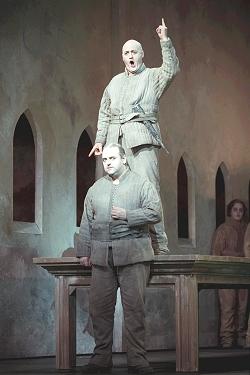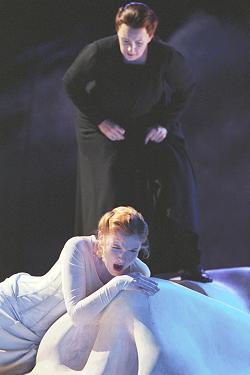|
<< -- 5 -- Roderic Dunnett UNALLOYED GENIUS

Pavlo Hunka's Lysiart, hobbling ominously as he enters, and grimly
isolated by the front proscenium (he and Adolar sizing each other up on
either side frontstage), is a remarkable presence. Lysiart's features
are a melting pot of emotion : eyes, nose, lips, jaw are constantly on the
move, engaging in one surly or furtive look after another. Piled high with
crimson and white flowers by the youthful Euryanthe, who seems to be taunting
him mercilessly, his face is the very picture of unnerved confusion.
Hunka's villain seems doubly isolated : from his fellows; and from
hope : his passion for Euryanthe is believable : Lysiart is not a no-hoper,
as Kaspar is often portrayed, but a serious contender for love as well as
lands. When Lysiart's dilemma emerges in Hunka's superbly delivered,
psychologically torn, four-section operatic scena which begins Act
II, the visual gamut of emotions becomes a musical one : this scene, along
with Kaspar's invocation, is one of the most impressive bits of sustained
operatic writing by any composer since Handel; Weber presages not just Wagner,
but Verdi too.

Pavlo Hunka (below) as Lysiart and John Daszak (above) as Adolar in Richard Jones's Glyndebourne Festival Opera production of Weber's 'Euryanthe'. Photo: Mike Hoban
|
'Rocks fall on me, fool that I was', Lysiart curses; sings;
Hunka's twitching fingers echo the spikes of the set, stabbing and
jabbing like the fatal knife with which he will polish off not happily Euryanthe
but the thoroughly deserving Ortrud figure, Eglantine. 'Ganz ist die
Wahrheit, ganz Natur, ganz Natur', he gloomily intones, and this was
superb -- the repetition seeming to spell the onset of a black madness. 'Sie
liebt ihn, ich muß untergehen' is a terrifying admission, for
Lysiart will 'untergehen' in many ways -- yield the girl, crash
to an emotional void, stoop to the Kasperian practices of the black abyss,
and ultimately lose his life.
Lysiart's vengeful conclusion, towards the close of the scena,
is that all he holds beautiful must be 'zerstört' -- destroyed.
One is reminded, chillingly, of the terrifying word 'zerrissen'
(meaning much the same -- the casting down of idols) in Bach's cantatas.
Lysiart is a great role, a figure of truly Verdian stature, done right --
as it was, unmistakably, here. His duet with Flanagan's Eglantine (like
her fingers-on-lips circling of her young rival) was wonderfully nasty;
but listen to it closely, and I do believe it's a dark parody of the
'good' music of Euryanthe and Adolar. There's a whole cellarful
of nuance going on in this score beneath the surface.

Lauren Flanagan as Eglantine and Anne Schwanewilms as Euryanthe (at the tomb of Emma) in the Glyndebourne Festival Production of Weber's through-composed masterpiece. Photo: Mike Hoban
|
Continue >>
Copyright © 28 July 2002
Roderic Dunnett, Coventry, UK
 RODERIC DUNNETT ON THE RESIGNATION OF NICHOLAS PAYNE
GLYNDEBOURNE FESTIVAL AND GLYNDEBOURNE TOURING OPERA WEBSITE
RODERIC DUNNETT ON THE RESIGNATION OF NICHOLAS PAYNE
GLYNDEBOURNE FESTIVAL AND GLYNDEBOURNE TOURING OPERA WEBSITE
|

